Baring A Few More GOLD TEETH: Marsh & Jim Talk Pirates
>GOLD TEETH is coming soon! Get notified on Kickstarter!<
Welcome, potential sea-urchin, to the TEETH newsletter! This is a (mostly) weekly transmission about our adventures in the very secret land of Tabletop Roleplaying-Games. We have published a series of our own TTRPGs! A new book is coming to crowd-funding soon.
What appears within this letter is written and compiled by speared fish, Jim Rossignol, and farmed eel, Marsh Davies. Come and join us over on the TEETH Discord! Free tooth emojis for everyone!
And hey, if you can wish to support us and also get a fantastic 320-page RPG, you can BUY OUR BOOK, if you aren’t already a member of that rather cool and highly exclusive club, that is. There’s also a whole range of related TEETH RPGs to go along with that.
Hello, you.
Links!
Marsh & Jim talk GOLD TEETH.
Hello, you.
We’ve been busy making charts and tables, inventing pirate crews, their flags, and their legends. It’s a life. And the GOLD TEETH Kickstarter goes live next week! Holy crap.
But we’ve not been the only ones who have been busy… TEETH Discord denizen Clément Martin has been translating NIGHT OF THE HOGMEN into the language of love. Yes, the at-least-once-requested French language version of La Nuit des Porcs Vivants is now available along with our own Pay What You Want downloads for that 4.9/5 rated one-shot. The Hogmen are coming, but they are also now multilingual.
And below we talk more about our latest RPG-making exploits, including the perfidious challenge of things not being in black and white.
Sincerely,
Marsh & Jim
LINKS!
THING OF THE WEEK: "Huh, Quinns has been quiet lately!” we said to ourselves, idly. And then we discover the reason why: a huge People Make Games documentary on how Actual Wargames (like, the games made of and for actual war) which leans very heavily indeed upon the soul of tabletop games as a medium. It’s a grim watch, but vital and entirely fascinating. More importantly, it absolutely confirms any preconceptions you might have had about the look, manner, and style of the kinds of people who work on such things.
Do check out Fernando Salvaterra’s work, much of which he posts to Bluesky. It’s so good. Salvaterra’s art, that is, not Bluesky. Although Bluesky is also good. If you haven’t already abandoned the bad place, then do so and find us at Bluesky, where the old communities are reforming, and the block button actually does things.
I enjoyed this short piece on triangular relationships and their connection to drama: a lovely primer if you’re trying to create this sort of tension in your RPGs.
This wasn’t new to us, but research this week nevertheless led us to BF Skinner’s attempts to create a pigeon-guided bomb. “The pigeons would follow the image, pecking at it, which would move the screen on its pivots. In the case where two possible targets were on the screen, Skinner noted that at least two of the birds would be in agreement and the third would be "punished for his minority opinion" to encourage it to steer towards the target preferred by the majority of the pigeons.” That feels like a metaphor for something, but I couldn’t possibly say what.
The Big GOLD TEETH chat!
Our next book, GOLD TEETH, will be coming to Kickstarter next week! You can sign up to be notified when it goes live.
The project is a standalone game of occult pirates in the 1780s, but is very much related to the first TEETH book, both in terms of the setting (which is directly connected to events in The Vale), the rules (which are a further evolution of our Forged In The Dark-based ruleset), and the general tone, humour, and quality of writing and design. The fact is that we learned a great deal from both the zine adventures and the big book, and we’ve been applying those lessons, building on them, and learning new things, in the next round of work we’ve been doing for the GOLD TEETH. In what follows we talk a little about that, with Marsh explaining the leap to full colour (while retaining the style and tone he established in the first chapters of our work) and a discussion of just how to get across the singular and strange nature of crewing a pirate ship for battles upon the high seas. Read on! And feel free to ask questions here or on our Discord. We love to hear from you.
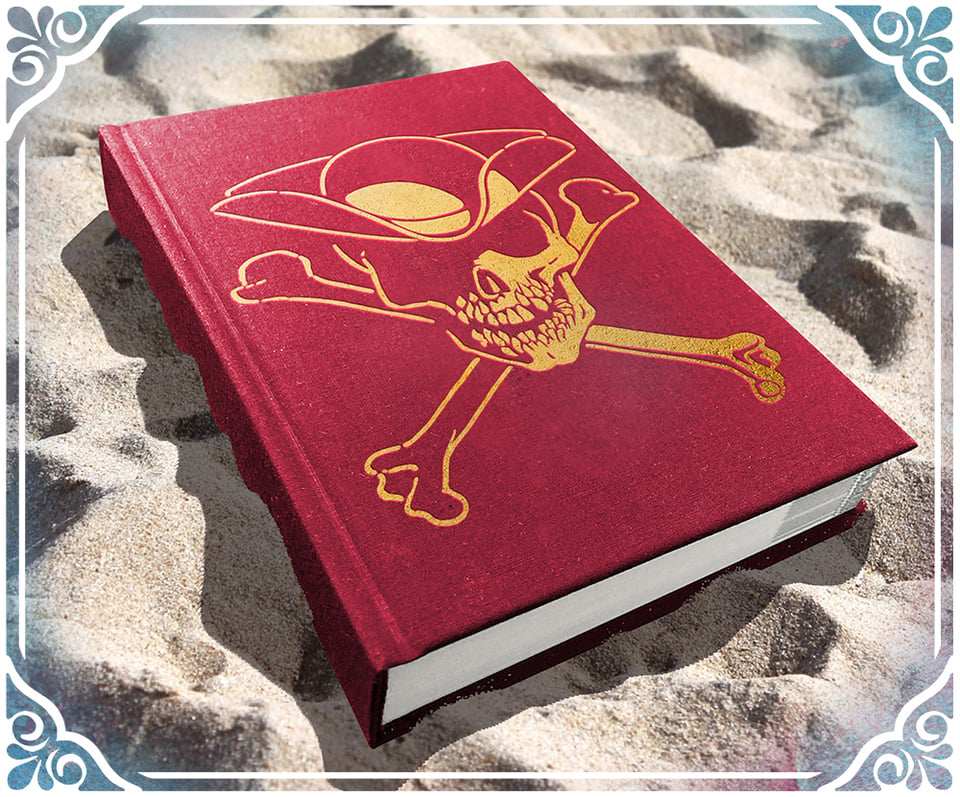
Jim: Hey Marsh, we’ve been working on GOLD TEETH for a while now, and I think the first thing I want to talk to you about is the ship-faring ruleset. We had a bit of feedback and are going to be revising what we tested a little: can you talk about what that looks like?
Marsh: All along, the thing we've been trying to nail is cooperative control of a ship. While you play as individual Seadogs for the rest of the time, when you're on a voyage, those piratical characters take a bit of a back-seat. Instead, players are assigned different parts of the ship's operation, and their rolls represent a test of the talents of the crew at large.
A player may control the Ship Station called Long Guns, for example, and they'll roll to aim and fire cannons, but also respond to any event that affects the gun crews themselves. If a fire breaks out on the gundeck, the same player will have to say how they respond—though they may get assistance from other parts of the ship.
It's important to remember that these Ship Stations represent people, and not just potential verbs—and that they're always involved in the operation of this complex machine, whether or not their particular Station is doing its Thing. So, it doesn't matter if Long Guns has anything to fire at: the men of the gun deck are still going to be affected by a powerful wave that crashes through the gun ports, or an extreme manoeuvre that causes the ship to tilt with little warning, sending cannon balls skittering down the deck. Forged in the Dark offers a great framework here with its "success with consequence" allowing a GM to bounce the repercussions of one Station's roll to a different player, keeping everyone involved in the story no matter which Station they control. This really works for the simulation of a sailship! They are, after all, machines made of people. all working on separate things, but together—and successes and failures resonate through the entire crew.
In our previous iteration of the rules, however, we gave each of these Ship Stations a different set of Actions that reflected the specificity of their function and the kinds of talent that could be brought to bear. It felt good from the perspective of enhancing each Station's sense of individual purpose, but it also meant it was just hard to keep all the different Actions in players' heads, and there were areas where it felt like we'd forced an unnecessary distinction on something that naturally overlapped. So our forthcoming revision compiles and condenses the Actions into a shared list for the entire ship. This also means it's easier to apply buffs and debuffs in a centralised way. That sense of uniqueness we wanted to give the Stations, meanwhile, has been displaced onto special abilities that the Stations can unlock over time—some of which evoke the talents of the individual Seadogs, allowing players to reconnect with their characters in this more abstract setting. And now that we are unifying this ruleset with the extremely cursed world of Gold Teeth, we can throw some fantastically weird and horrible shit in there, too. Worse things happen at sea, they say, and oh boy are we exploring that.
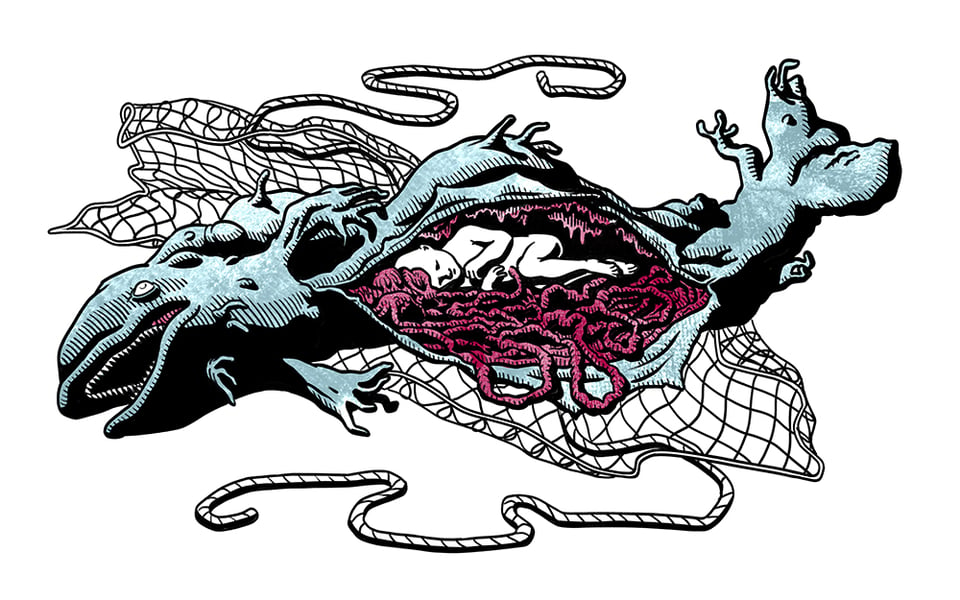
Jim: Yes, it’s been interesting to see this take shape. I think the idea of a ship as an entity made up of people is really crucial for a seafaring (or even perhaps a spaceship) game, and we’ve certainly looked closely at what other games have done with their rules, many of which take the principle that we’ve tackled here to very different places. The ship stuff is far from our only big challenge for rules -- the aforementioned Seadogs get a great deal of attention, as well as the doom that they face. I think one of the things that’s most exciting about pirate stories, as well as sea-faring stories more broadly, is the struggle against fate, and against doom. The sea is such an implacable backdrop of inevitable disaster that it would be impossible or even foolish not to make it the central motor of this. Our Seadogs face an urgent need for redemption… But let’s come back to that. The other big thing to discuss up front, I think, is your move into colour design and illustration for this project. I know that’s been a significant timesink: can you talk a bit about your R&D, and how you reached the striking look we are seeing in the new images?
Marsh: The art style represents about seven months of idiotic prevarication on my part! There are a lot of boringly practical considerations: colour books are more expensive to print, more complicated to set-up for print, and trickier to lay out. With the black and white style I'd developed for Teeth, I could be reasonably sure I could throw any picture on any page of the book and it would still work. With colour, suddenly I'm not just having to think a lot harder about how an individual picture looks, but whether it will work on the page with the other colours there. And, of course, each individual picture takes longer to make. Finally, let me conclude my egregious whining by saying I wasn't sure how to make colour illustrations feel right for the period—Teeth's black and white pictures, while unlike anything you'd actually find in the 18th century, had a sort of fustiness to them that felt right. Could I achieve that in colour? (No.)
Anyway, I basically spent half a year going back and forth—which I realise must have been extraordinarily annoying, Jim. Apologies!
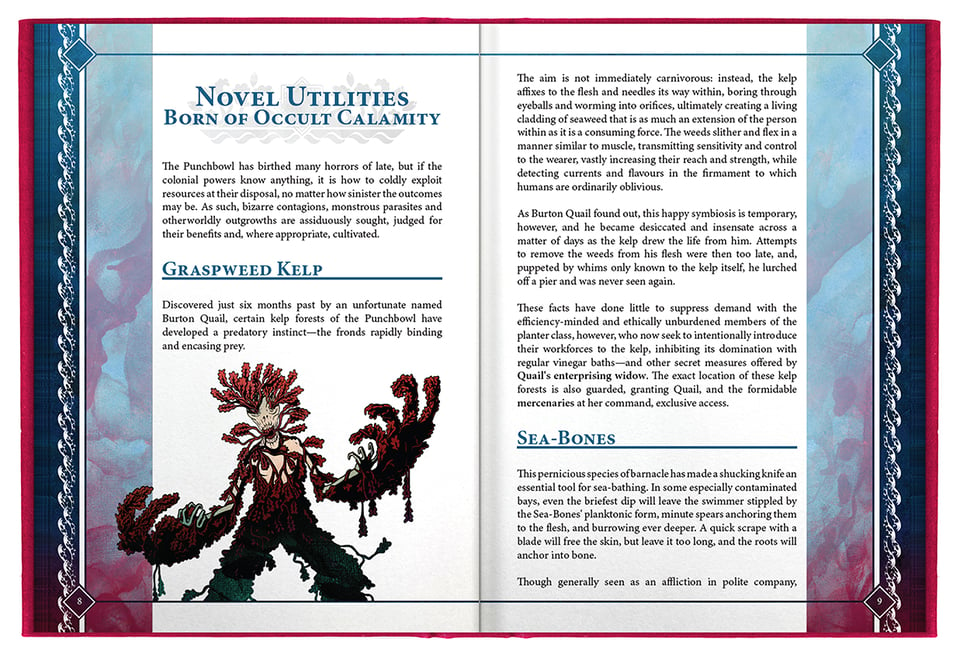
Jim: That’s fine, I had other stuff to getting on with!
Marsh: Just as well. Anyway, I'd just about given up on the idea colour altogether when I hit upon a combination of textures by accident that unlocked the entire palette in my head. I had been playing with canvas, ink and sand, and I stumbled upon a particular set of filters and colours that gave the impression of blood dissipating through blue-green water, or soaking into sailcloth. And I realised that I could sort of wash all the illustrations I'd done in this palette to give them a sense of cohesion on the page.
We have not solved all the problems, and I will no doubt be cursing Past Marsh when it comes to grappling with the hideous complications of colour spaces for printing, but I'm pleased with how it looks, and I've decided not to care about whether it feels apposite to the period.
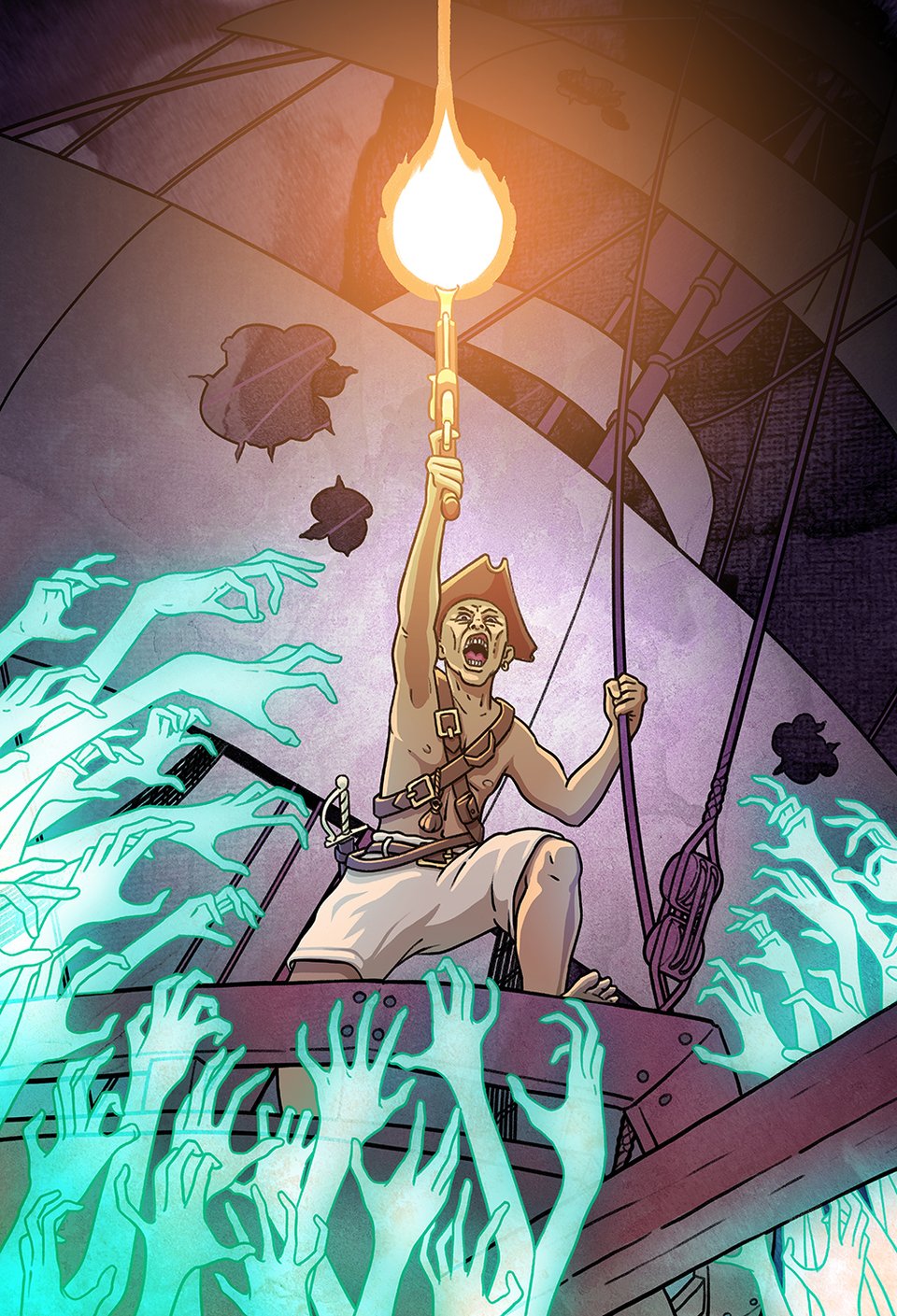
Jim: Speaking of the period, colonisation is a big theme for GOLD TEETH, and not just political and cultural, but biological and magical? How do you think that influences the vibe of the game?
Marsh: The unifying word here is grotesque. There are very real, unutterably horrifying things being done in the name of colonialism at this time. Creating a game in this setting is a challenge: we neither want to exploit those atrocities for entertainment, nor do we want to walk away from them like they never happened, even if we've otherwise created a fictional, magical, mega-lagoon to play in. And I think the comic tradition of the grotesque gives us the tools to reckon with it in an earnestly furious way, while also permitting access to satire, farce and horror as vectors of attack.
Jim: Yes, there’s a really strong sense in which the comic mode gives us access to such horrors in a way that acknowledges its evil. One of the things I have loved about the group we play with regularly is how we have been able to be horrified and frightened while laughing. Humour does not, as we so often point out, mean that you are not taking a subject matter seriously. Being funny is not the same as being frivolous or trivial, indeed, it is comedians who often tackle the most painful aspects of human existence most effectively. And that’s because humour, laughter, is one of the most human of actions: it is the sound of our shared and mixing emotions, our overcoming of the incongruities of the universe. And the fact that this happens even in “serious” games with quite solemn subject matters speaks very much of how laughter is a vital social currency. The solitary laugh, while not always bleak, is a very different sort of thing.
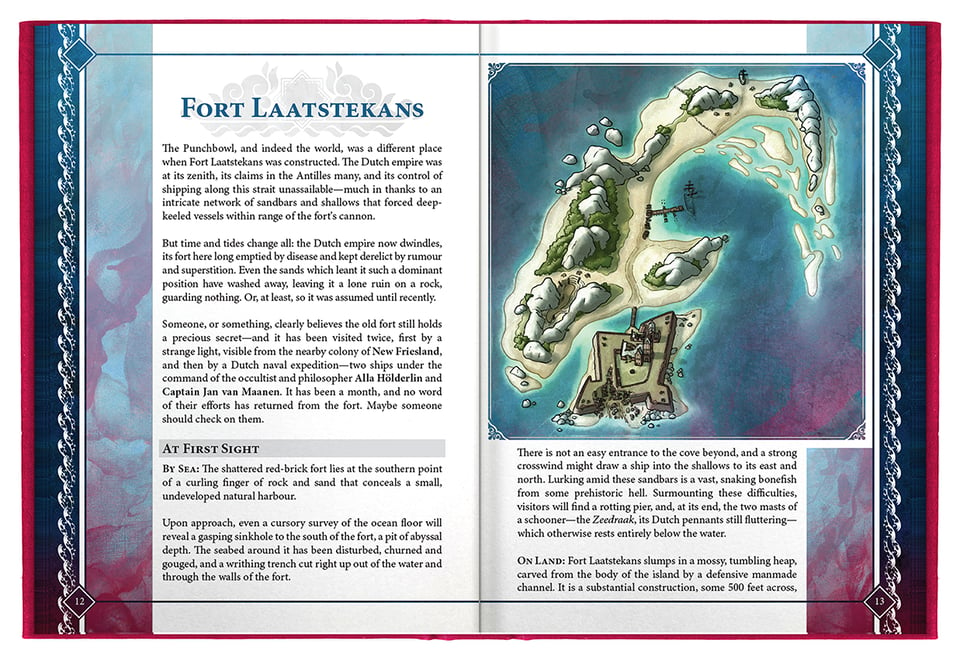
Marsh: I think about how, for example, Blackadder Goes Forth operated firmly in the realm of comedy despite talking about the horrific loss of life in World War 1. Its comedy was excoriating, and its targets were the perpetrators of this atrocity, the insanity of the class system and acquisitive nationalism, not the victims. It managed to end on one of the most profound and moving sequences on telly at that time. I'm not going to claim we manage that, but I think we're trying to be conscious of how our playable fiction encounters and discusses colonialism, even giving players incentive to avenge themselves upon it as a means of redemption. The more fantastic forms of colonisation you mention—like being co-opted by a mass of seaweed that drains you to a desiccated husk, or being consumed by a pirate curse—are metaphorically quite well-aligned. Horror is often an effective metaphor for real-world trauma, and here I think the connection between magical parasitism and colonial exploitation is pretty easy to draw: both should be suitably revolting.
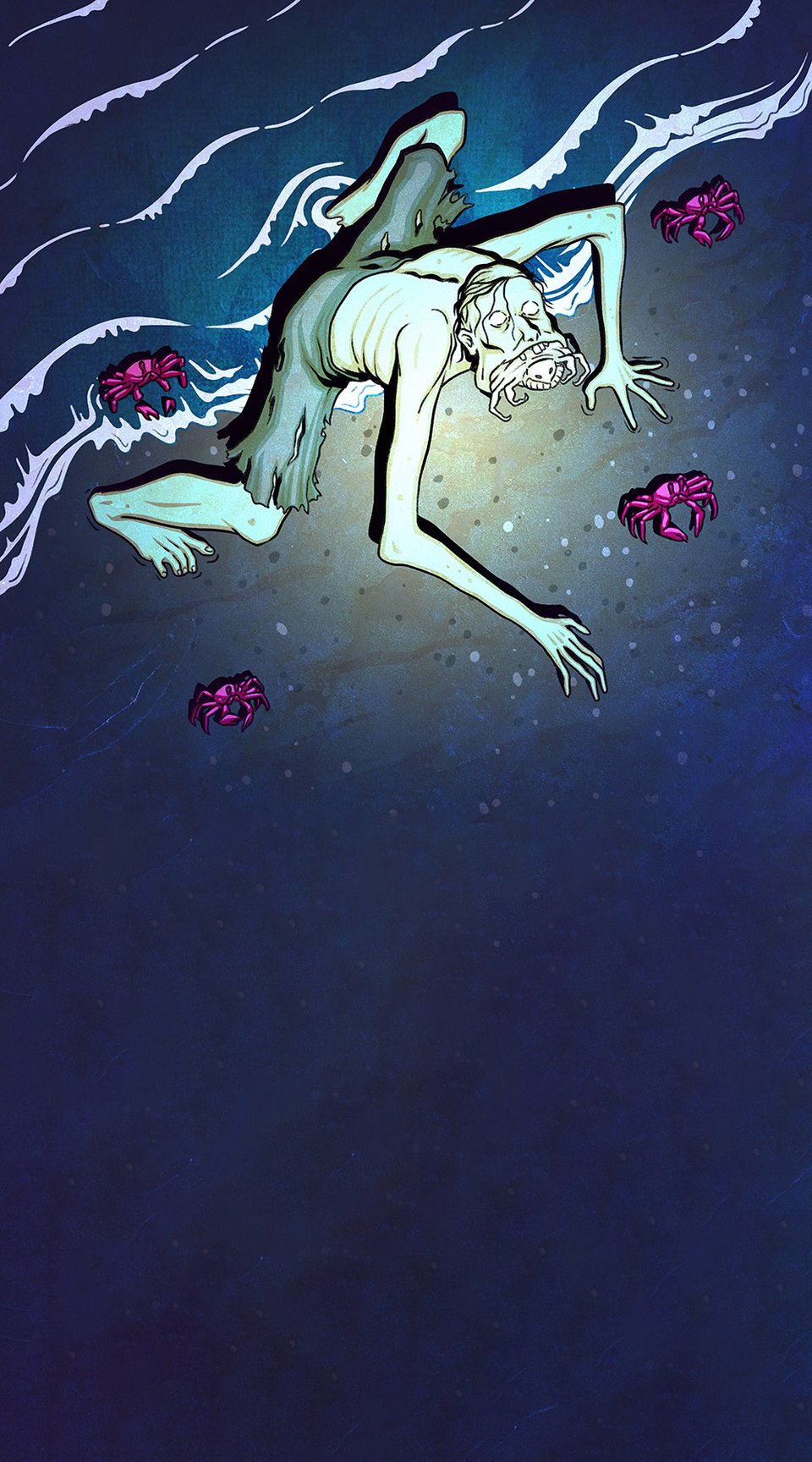
Jim: The mention there of redemption brings me back to something I mentioned upthread there, which was the narrative motor of our game. All our previous games have some momentum supplied by what the characters want from The Vale, and in this we are seeing what our players want from an area of the Atlantic (which we have invented) called The Punchbowl. What they want, in this case, comes under the broad category of redemption, because the Seadogs are bad people. In the original TEETH game we suggested that the characters were “not necessarily bad people”, I think here it’s fair to say that pirates are probably even less likely to have been good to begin with. But that does not mean redemption is not possible, or desirable. And it’s this upon which the arc of a campaign rests: our characters will understand that they face a doom, and that it is coming. Finding their way to redemption, by achieving their goals before the clock of fate runs down, offers a way to feel like these flawed, sometimes wretched weirdos can reach for heroism and victory, while also hitting the mounting tension thing that we try to squeeze into all the TEETH games. I feel like all the TEETH games work best when you’re beginning to sweat as a campaign unfolds, and that should be particularly evident here. It’s also the bit of the game that I am, as a GM, most excited about running myself and seeing how other people handle. Plus I watched all of Black Sails and if a single TEETH campaign manages that sort of arc I will cry, just as I did at the end of that show.
Marsh: If our game facilitates players absolutely mangling a number of different accents then we will have stayed true to Black Sails' purpose and vision, certainly. I'm rewatching it at the moment, and I hit a bit last night that I had to rewind three times just to try and make sense of a sentence Charles Vane had said, or more accurately, a vocalisation he emitted as a low-frequency vibration without managing a single consonant along the way. He does get his willy out a lot, though, so fair play to him.
Jim: Yes, he really manages to do that more blatantly that most. To change the subject a little, though, while staying on the topics of accents: do you ever think about how the absurd and possibly entirely concocted “Talk Like A Pirate Day” is no different for people who live here in Bristol?
Marsh: Imagine an alternative universe in which Robert Newton had decided to do his influential performance of Long John Silver in a Newcastle accent* instead. "Wey aye, man, that treasure is a reet bobby dazzler."
Jim: I am trying to imagine. But if you were a pirate, what would your pirate name be? Ol’ James Beardeye they call me.
Marsh: Quite right too. I've always thought your eye-beards were most fetching. I'm not sure I'd live long enough at sea to get a name, but there is a character in the Master & Commander books called Awkward Davies. We are not much alike in other regards, but the name fits!
Jim: Did you know I once went to the Bahamas and saw a) a shark, and b) a Manta Ray. And, later, visited a sandbar in the middle of the sea? I even ate a fish that a sun-burned man caught. That makes me two thirds maroon and, given that I have a Bristol postcode, one third pirate.
Marsh: You also mysteriously acquired a (cursed?) pirate coin. I think the universe is telling you something.
Jim: All the universe is a sea, Marsh. Let us sail upon it, and/or perish!
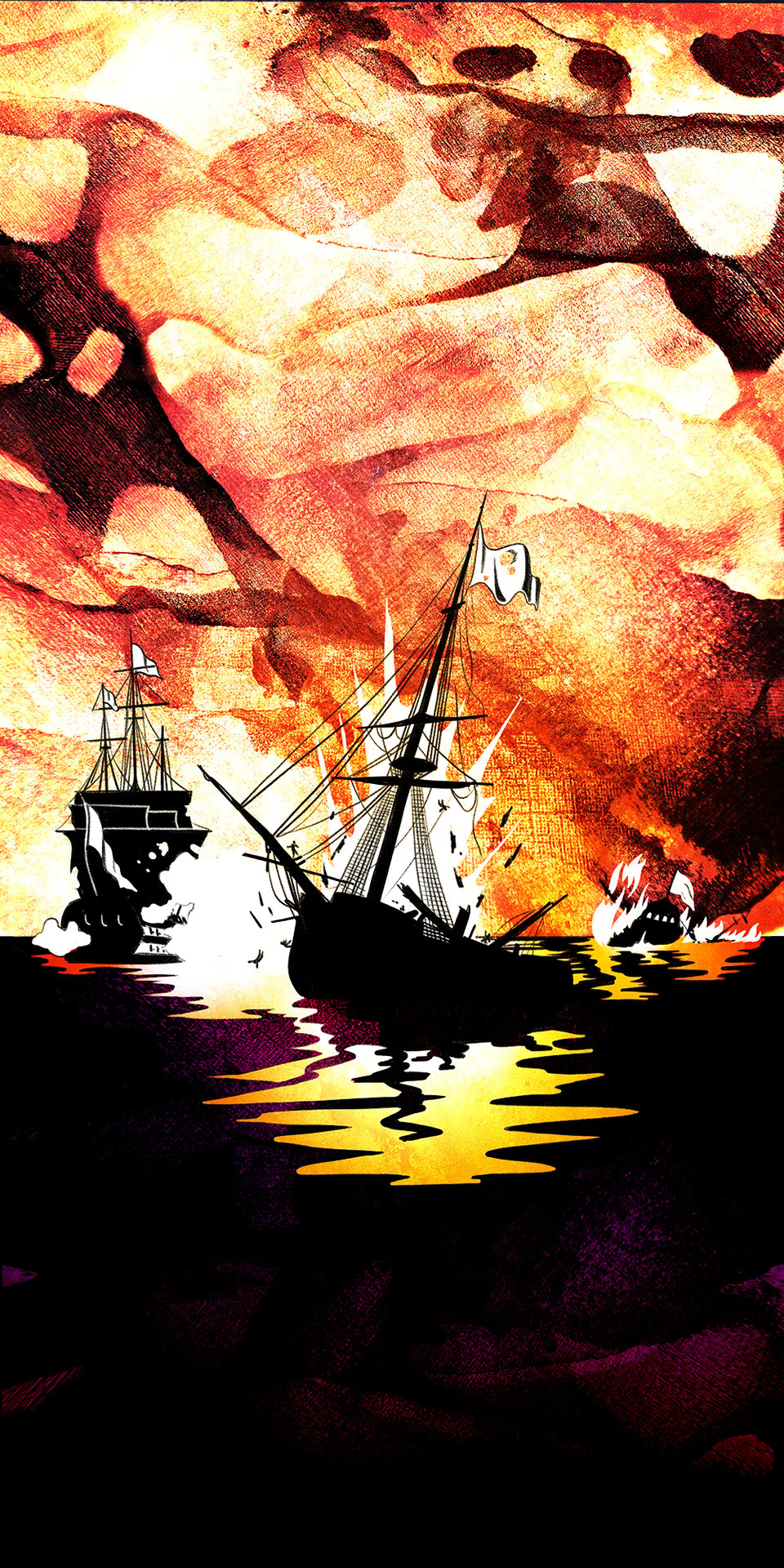
*I tried to find a video that appropriately explained the Newcastle accent to the main non-British people who read this newsletter, but failed to find anything that wasn’t either bad or weirdly exploitative. Suffice to say that it’s one of the UK’s more extreme accents, to the point of possibly being a dialect, given that it retains a slew of Old English words and pronunciations. Once you have heard it, well, it’s unmistakable. - jim
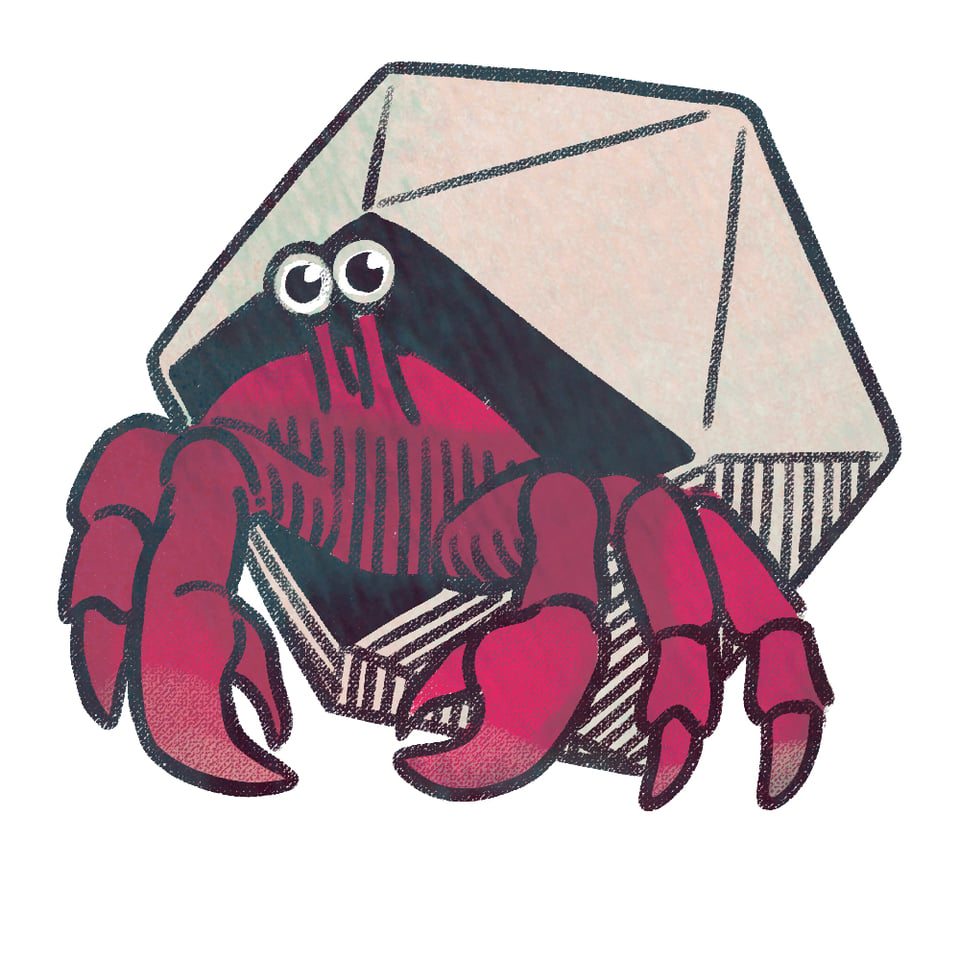
Add a comment: